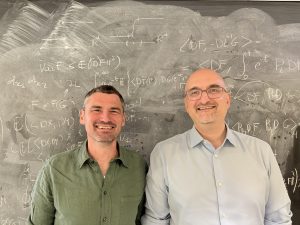In a world increasingly shaped by artificial intelligence, a team of mathematicians at the Faculty of Science, Technology and Medicine has made a remarkable leap forward in understanding how neural networks — the engines behind technologies like ChatGPT — really work.
New insights into AI’s brain
Led by Professors Ivan Nourdin and Giovanni Peccati, and in collaboration with experts from Italy and the United States, the team conducted a new study that provides fresh insights into deep neural networks. Specifically, these complex, layered systems are inspired by the way the human brain processes information.
Why does this matter? Neural networks are notoriously difficult to analyse. Made of thousands, sometimes millions, of interconnected nodes, their behaviour can seem almost magical. But the Luxembourg-led team has shown that, under certain conditions, these networks behave in surprisingly predictable ways. Using advanced mathematical tools, they’ve proven that as neural networks grow larger, their behaviour becomes arbitrarily close — in a precise, quantifiable sense — to that of a well-known statistical model. This model is the Gaussian process, an ubiquitous random object driven by what many of us might recognise as the classic “bell curve”.
From mathematical theory to real-world impact
This might sound abstract, but the implications are profound. By understanding how neural networks behave at large scales, researchers and engineers can design smarter, more reliable AI systems. It’s a bit like discovering the blueprint behind a black box. Suddenly, we can see how the parts fit together and predict how the system will respond.
The project is more than just a theoretical exercise. It’s already inspiring new research and helping train the next generation of AI experts. It’s also sparking conversations across fields like computer science, engineering, economics, and ethics. The team has even launched a public lecture series and is preparing a podcast to reach a wider audience.
As Prof. Peccati reflects, “We’re not just building tools for today—we’re laying the groundwork for the technologies of tomorrow.”In doing so, he and Prof. Nourdin have shown that even the most theoretical mathematics can have a profound impact on the future of artificial intelligence.
The research conducted by Profs. Nourdin and Peccati received support from the FNR
